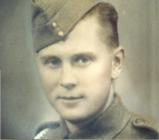1
Tina Jorden-Resident of Innisfail during World War IIInterviewed on January 29, 2004
Tina Jorden was born and raised on a farm west of Innisfail in the Oklahoma district. Her parents immigrated from Scotland about 100 years ago, lived in Calgary for awhile, then moved to the Oklahoma district when their kids were born. She had one brother and two sisters, all older than she was. Tina is the last remaining member of her family. Her husband Ron came to Canada from England in 1927, and they went to public school together for awhile, though he went to high school in Innisfail while she went to high school in Bowden since that was where her brother was living at the time. They were married in 1936, about four years before Ron enlisted in the military. They have been married 68 years.
Tina's mother went to Scotland just before World War II to visit a brother she hadn't seen in 40 years. She had difficulty getting back to Canada even before the war started. She had written to say she was going to try and get passage on a certain boat, and around the time her family got her letter they also heard news that the ship had sunk. Thankfully, her mother was on the next boat, but since news was delayed no one knew what had happened for awhile. Her mothers cabinmates had been on the sunken ship, but had been rescued, and they went to bed each night fully clothed and prepared in case of another accident.
3
Ron enlisted in Red Deer and joined the Artillery, which was the wrong thing to do since he was not a gun person, after the fall of France. He joined in May 1940. He trained in Calgary for awhile, and Tina got a room there to be near him. However, he had difficulty getting away to spend time with Tina, so she returned to Innisfail after about one month. She stayed partly with her parents and partly with his. Her parents were still on the farm and getting older, and appreciated Tina's help. Ron's mother had passed away before he and Tina were married; his sister was taking care of his dad and was glad to have the help and company Tina brought. After Ron was discharged, they kept the same arrangements for awhile.Ron was in the military for about 6 months, until he got sick in Winnipeg where he was training after he left Calgary. He was in the hospital for a long time, and the doctors told him he was not fit for the Artillery. They gave him a choice: he could either take an honourable discharge or an office job with the military. Ron had his grade 12 diploma, which was worth more back then, and took the discharge knowing he would be able to get a job after returning home. It had been hard for Tina to see Ron go off, and she was relieved to have him back home. He didn't work for awhile, until he met the principal of the local school who told him he could take a short course and teach for a living, which Ron decided to do.
In his first year of teaching, Ron was called up to the military through conscription, but they couldn't take him because he had an irregular heartbeat, which he wasn't informed of in Winnipeg. This heartbeat didn't cause much of a problem till he was older; it may have been cause of his heart attack or stroke.
5
Innisfail changed a little during the War years, in that they were then building the air base near Bowden, now the Bowden Penitentiary, which resulted in a fair amount of people moving to the area. The community grew some during the war, but picked up considerably afterwards.Tina and Ron owned a 3 acre lot near where the hospital now is. They moved to town and lived above the Globe store for awhile before moving to the farm, which was west of town. On the farm they had a Jersey cow, and sometimes neighbours would buy cream from them which helped to supplement their income. They also had some chickens which Tina quickly gave up trying to dress and sell.
There were new buildings being erected regularly, and it was a stressful time with everyone watching and waiting to see if their boys would come back. News was delayed, so no one would know if their loved ones had been harmed until a considerable amount of time had passed.
The rationing during that time was particularly difficult. There was a limited amount of sugar, tea, gas, kids clothes (especially little boys clothing), flannelette for baby diapers, cheese, and jam. The rationing hit small families harder. People were allowed extra sugar at canning time, as they couldn't save fruit any other way and needed a certain amount for health reasons. They also canned vegetables, fruit, and meat. Tina and Ron shared food with Ron's dad who, since he did not have a large family, struggled with rationing.
Canadians didn't suffer as much, from rationing and stress among other things, as people in Europe. When Tina's aunt visited, she couldn't get enough canned salmon because it had been cut off during the war, while in Canada it had been a staple and they had longed for food stuffs OTHER than canned salmon.
Ron and Tina had two children, Dean and Beverly, and Ron continued with his teaching career.

